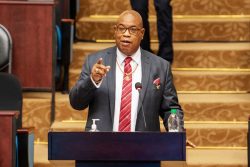Dear Editor,
Like everyone else, I heard yesterday of the passing of Peter Kempadoo in England. No doubt, the newspapers will be full of details of his life and work, but I must add my share in the effort to bring him back to life for generations to whom he was just a name.
Peter Kempadoo was a native of one of the many villages on the Corentyne of eastern Berbice. I did not know him personally before he returned from England, and this was about the second half of the sixties. From what I knew, he had been a literary figure in England where he had published his novel, “Guyana Boy”. It was only in 2005 that I read an edition of “Guyana Boy”. My impression was that it was an artistic recapturing of life in that part of the country, as it was in the intersections between Berbice communities. In reflecting that reality, as the author experienced it in his boyhood, “Guyana Boy” should be of lasting value. Peter Kempadoo was also a broadcaster on radio and a poet.
Through the years that I remember him in Guyana, he was living with his family in Golden Grove, East Coast, Demerara from which point, he visited numerous communities on the coast and in the hinterland. His main interests were the various expressions of Guyanese culture. Many households will remember his visits to their garden plots, introducing new plants, the wing-bean for example, and talking of their properties and, in particular, his advocacy of bio-gas as a form of energy. In the efforts to promote bio-gas, he networked with several community development officers and agronomists of the Department of Agriculture and the School of Agriculture at Mon Repos. I cannot tell what is left of all these efforts. However, a daughter of the Kempadoos has distinguished herself as a novelist, her first work being “Buxton Spice”, a warm-blooded story of teenage life set in the environment of Golden Grove-Nabaclis. My late wife, Tchaiko, was one of Peter Kempadoo’s students in garden agriculture, and he, like Rigby Dover and Mister Hope, was one of her teachers. .
I last met Peter Kempadoo in 2005 when we were both invited to New York to receive awards from Dr. Vibert Cambridge and the Guyana Cultural Associations. Passing through London decades ago, I was able to visit his wife, Rosemary, during an illness that she did not survive. In Guyana, Peter Kempadoo was a familiar figure with long locks of hair and loose clothing, as he moved between communities. He spent a lot of time at art galleries, theatres and other cultural events, as well as with children. He was a friend of the late Vesta Lowe, folk song musician and resident of Manchester on the Corentyne. He also, with members of the Ministry of Information, made a full recording of ASCRIA’S FESTIVAL OF AFRICAN DRUMS, held at Sandvoort, East Bank, Berbice in the early 1970’s. His embrace of Guyana’s culture should have special meaning today, as the society faces new challenges. I offer my sympathy to his bereaved family
Yours faithfully,
Eusi Kwayana






